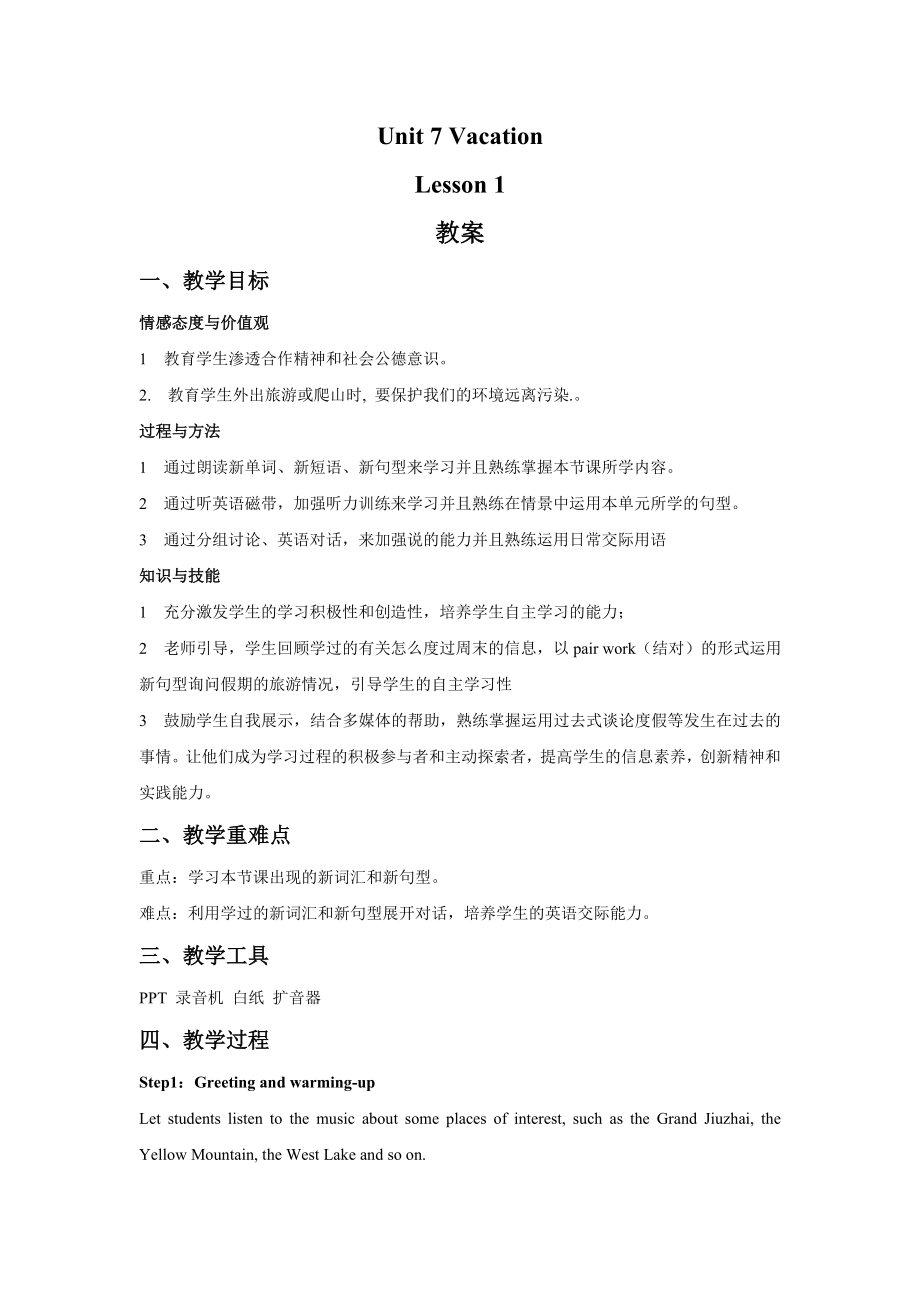《六年級(jí)下冊(cè)英語教案Unit 7 Vacation Lesson 1 Enjoy the Story 北師大版三起.doc》由會(huì)員分享�����,可在線閱讀����,更多相關(guān)《六年級(jí)下冊(cè)英語教案Unit 7 Vacation Lesson 1 Enjoy the Story 北師大版三起.doc(3頁珍藏版)》請(qǐng)?jiān)谘b配圖網(wǎng)上搜索。
1�����、Unit 7 VacationLesson 1 教案一��、教學(xué)目標(biāo)情感態(tài)度與價(jià)值觀1 教育學(xué)生滲透合作精神和社會(huì)公德意識(shí)�。 2. 教育學(xué)生外出旅游或爬山時(shí), 要保護(hù)我們的環(huán)境遠(yuǎn)離污染.。過程與方法1 通過朗讀新單詞���、新短語�、新句型來學(xué)習(xí)并且熟練掌握本節(jié)課所學(xué)內(nèi)容����。2 通過聽英語磁帶�,加強(qiáng)聽力訓(xùn)練來學(xué)習(xí)并且熟練在情景中運(yùn)用本單元所學(xué)的句型����。3 通過分組討論、英語對(duì)話����,來加強(qiáng)說的能力并且熟練運(yùn)用日常交際用語知識(shí)與技能1 充分激發(fā)學(xué)生的學(xué)習(xí)積極性和創(chuàng)造性,培養(yǎng)學(xué)生自主學(xué)習(xí)的能力���;2 老師引導(dǎo)��,學(xué)生回顧學(xué)過的有關(guān)怎么度過周末的信息�����,以pair work(結(jié)對(duì))的形式運(yùn)用新句型詢問假期的旅游情況���,引導(dǎo)學(xué)生
2、的自主學(xué)習(xí)性3 鼓勵(lì)學(xué)生自我展示�����,結(jié)合多媒體的幫助����,熟練掌握運(yùn)用過去式談?wù)摱燃俚劝l(fā)生在過去的事情。讓他們成為學(xué)習(xí)過程的積極參與者和主動(dòng)探索者���,提高學(xué)生的信息素養(yǎng)�����,創(chuàng)新精神和實(shí)踐能力��。二���、教學(xué)重難點(diǎn)重點(diǎn):學(xué)習(xí)本節(jié)課出現(xiàn)的新詞匯和新句型。難點(diǎn):利用學(xué)過的新詞匯和新句型展開對(duì)話���,培養(yǎng)學(xué)生的英語交際能力�����。三���、教學(xué)工具PPT 錄音機(jī) 白紙 擴(kuò)音器四、教學(xué)過程Step1:Greeting and warming-upLet students listen to the music about some places of interest, such as the Grand Jiuzhai, the Y
3、ellow Mountain, the West Lake and so on.Step2: PresentationWhen they listen to the music of the Grand Jiuzhai, the teacher asks: “Whats the music about? Can you guess?”Ss: Jiuzhai Gou.T: Yes, the Grand Jiuzhai. Its beautiful. Now there are some pictures of places, theyre beautiful too. Guess what th
4��、ey are.(show the students some pictures of beautiful places, including the pictures of New York City, Shanghai Museum, the Yellow Mountain and the beaches.) teach them the new words “New York City, summer camp, the beach, the museums” at the same time.T: I went some place last summer vacation. Guess
5��、 where I went.You can ask like this: “Did you go to?”S1: Did you go to the Yellow Mountain?T: No, I didnt.S2: Did you go to the West Lake?T: No, I didnt.S3: Did you go to the Grand Jiuzhai?T: Yes, you are right. You are so clever. I went there with all the teachers in our school. It was very beautif
6�����、ul. How was my vacation? Do you know?Ss: Sorry./No, How was your vacation?T: my vacation was really exciting, The water there was fantastic.The weather was quite cool in summer. The people were very friendly.But at last, it rained, it was rainy. The bus trip was boring.Then get the students to read
7���、new words: vacation, friendly, rainy, fantastic. Let the students try to guess what they mean.Step3: Ask and answerGet the students to ask and answer in pairs like this:A: Where did you go on vacation?B: I went toon vacation.A: How was your vacation?B: It was pretty good / exciting / relaxing / bori
8�、ng / awful / beautiful.A: How were the mountains / water / lakes / beachesthere?B: They were beautiful / fantastic / wonderfulA: How was the weather there?B: It was rainy / sunny / cloudy / snowy /A: How were the people there?B: They were kind / friendly / unfriendlyGet the students two minutes to g
9��、et ready for it, get them to ask and answer in pairs.Step4: Play the guessing gameBefore playing this game, give a piece of paper to each student, and ask them to write down which places he or she went to on vacation�����。After writing down the answers, get them to hand in their paper.T: Now I know all places you went. I know xxx went to some place on vacation. Guess where she went. You can ask like this: “Did he / she go to?” The boys and the girls have a game. 五�、課后作業(yè)1.熟記本單元的單詞和句子。2.與父母對(duì)話本單元的對(duì)話��。
 六年級(jí)下冊(cè)英語教案Unit 7 Vacation Lesson 1 Enjoy the Story 北師大版三起.doc
六年級(jí)下冊(cè)英語教案Unit 7 Vacation Lesson 1 Enjoy the Story 北師大版三起.doc

